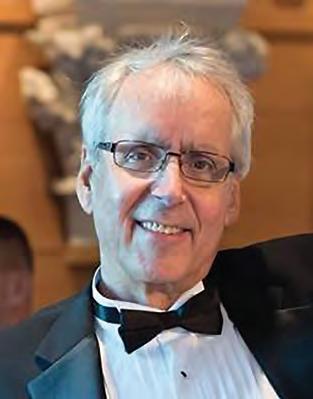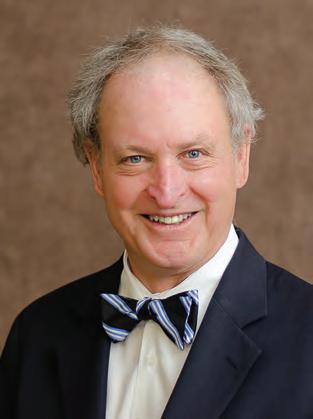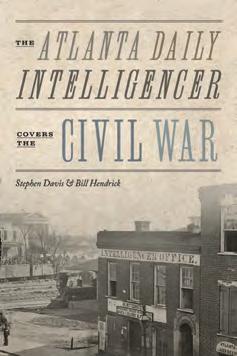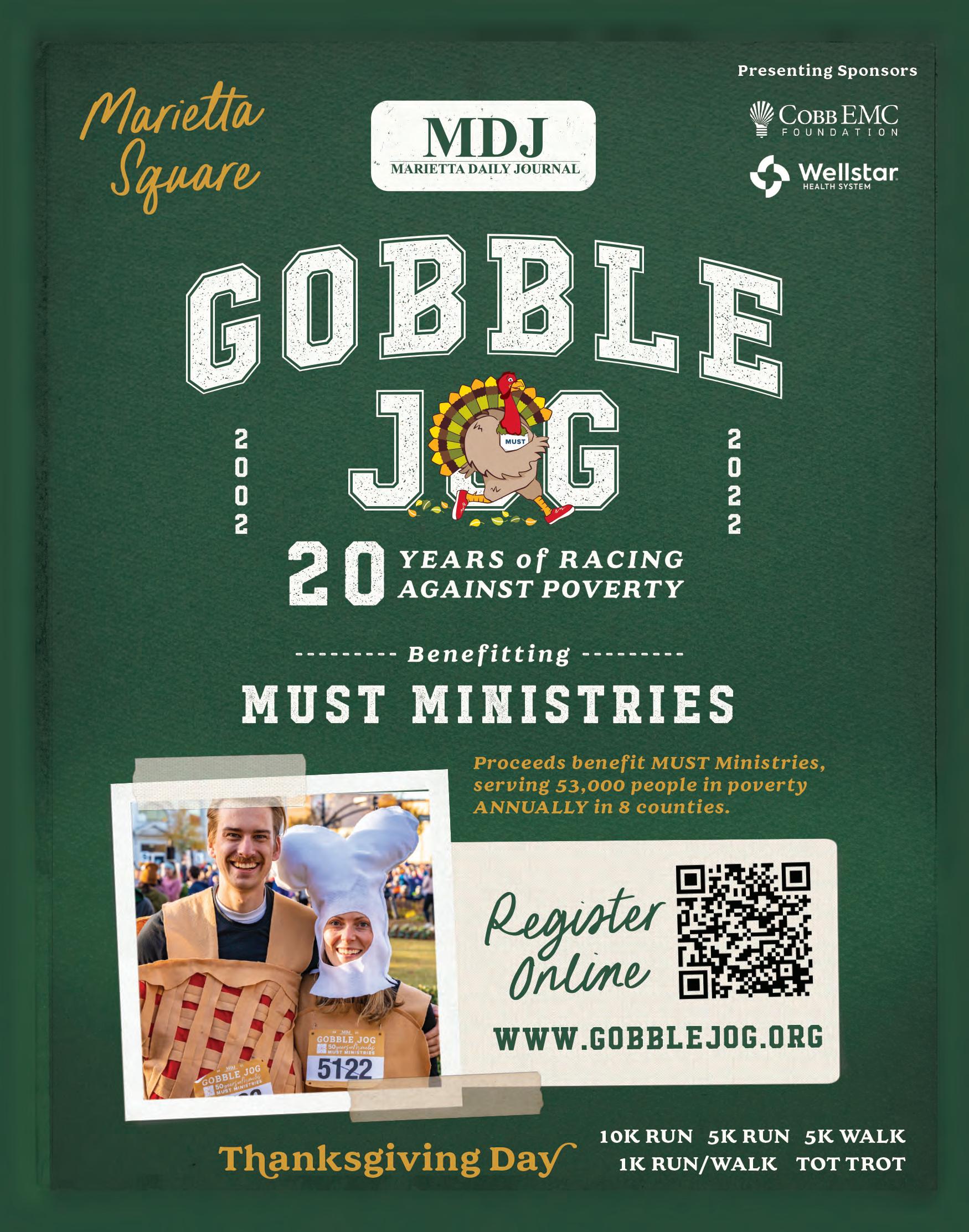
7 minute read
Author Q&A
QAAND MEET THE AUTHOR By Madison Hogan
BBILL HENDRICK had mulled the idea of writing a book on the Civil War for years, but he kept putting it off. During his time at the Atlanta Journal-Constitution, he met Stephen Davis, a Civil War expert, he interviewed for stories at the paper. After Hendrick officially retired from the newspaper business, his friendship with Davis continued.
When the old friends met up for lunch at Goldberg’s Eats in East Cobb in May 2017, they developed a pitch: a book on Atlanta’s leading newspaper during the Civil War, “The Atlanta Daily Intelligencer.” After Davis sent the proposal to the University of Tennessee Press, the two started working on their first collaborative book together, “The Atlanta Daily Intelligencer Covers the Civil War.” A native of Portsmouth, Va., Hendrick studied journalism and history at the University of Georgia, graduating in March 1971. He spent eight years as BILL HENDRICK a reporter and editor for The Associated Press in Atlanta, Birmingham, Louisville, Frankfort, Ky., and Manhattan, before moving back to Georgia after his first son was born to work for The Atlanta Journal Constitution. There, he covered business, health, science, history, the military and general features. In 2008, he retired to become a freelancer, writing for the AJC, the Marietta Daily Journal and other publications. Hendrick, and his wife of 46 years, Laura, live in east Cobb. Sons Jordan, 43, and Stuart, 39, are both graduates of Walton High School and the University of Georgia. Jordan practices law in Marietta and Stuart is a teacher, writer and artist in Atlanta. Hendrick, 74, is currently working on a second book, focusing on 19th
Scentury newspapers. STEPHEN DAVIS of Cumming is author of seven books on the Atlanta Campaign, including a two-volume study of Confederate General John B. Hood. His next one, “I Thank the Lord I Am Not a Yankee: The Wartime and Postwar Journals of Eliza Frances Andrews,” will be published later this year by Mercer University Press.
Cobb Life Editor Madison Hogan chatted with Hendrick to get the scoop on the pairs’ latest work, what inspires him and how writing continues to STEPHEN DAVIS shape his life.

CL: How did the idea for “The Atlanta
Daily Intelligencer Covers the Civil War” come about?
BH: I’d had the idea for at least 15 years but kept procrastinating. During my time at the Atlanta paper, I met Steve Davis, one of the top experts on the Civil War in the country, so whenever I was called on to do a story on any Civil War topic, such as the discovery of unexploded shells around Atlanta, I interviewed him. These talks turned into friendship that lasted after my retirement and to this day. We were having lunch one day and discussed writing a book on Atlanta’s leading newspaper of the Civil War period. Within two days of that May 2017 lunch at Goldberg’s in east Cobb, where we both lived at the time, he’d completed and sent off a book proposal to the University of Tennessee Press, which agreed after sending it to numerous scholars that it was a good idea and overdue. As a long-time journalist I’d always wondered how reporters did their jobs long before the Internet, iPhones and even before typewriters were invented. Steve’s knowledge and enthusiasm turned a stale idea into a fresh product. It got me moving.
CL: What separates this book from
other pieces you’ve written? What connects it?
BH: I wrote about almost everything you can think of, including economic and health issues, and history - one of my main interests - only on occasion. The book touches on many topics I wrote about in 30 years at The AJC and eight at The Associated Press, including health and politics and war. I’ve interviewed hundreds of veterans of World War II, Korea, Vietnam, Iraq and Afghanistan and in some cases, families of men killed in action.
CL: What can readers expect from “The
Atlanta Daily Intelligencer Covers the Civil War”?
BH: A thorough understanding of how southern newspapers reported the news and propagandized it in an era before objectivity. They’ll also learn that there are many similarities between what papers do now, and what they did then. The goal is to inform. In Civil War times, papers were as much propaganda sheets as reports on what was happening in the world. Then as now, papers made money from advertising. In the Civil War era, papers often filled the front page with ads, though more news began appearing on the front page as the war progressed.
CL: How does inspiration strike you? BH: Like most journalists, I’m inspired by the idea of learning things I don’t know, and also witnessing history. Our book shows how Atlantans (and people across the country) learned about what was going on in the world. When I hear about subjects I know little about, I want to ‘’cure’’ my ignorance. This ranges from what makes soldiers follow orders to what makes the brain work. I did a story once at the Los Alamos National Laboratory in New Mexico, interviewing scientists who had done research on why bravery, and cowardice, are contagious.
CL: Do you have any rituals/best
practices for writing?
BH: Set yourself a deadline. Take copious notes. Fill notebooks with facts and color. Get many points of view by never relying on just one or two sources. Organize your notes and make a rough outline of points you want to make. Maybe most important, ask questions. When I was very young I was assigned by The AP in New York to cover a professional tennis match. I’d never seen a tennis match and had no clue about the rules. But I asked a lot of questions and took a lot of notes and the big guys in NY praised the story to my shock.

THE FOLLOWING IS AN EXCERPT FROM STEPHEN DAVIS AND BILL HENDRICK’S DEBUT BOOK
“The Atlanta Daily Intelligencer Covers the Civil War.”
While going through five years of microfilm, which is a blinding process, I found this telegram, published July 26, 1863, on page 2 of the Daily Intelligencer, particularly poignant because it sums up the meaning of war:
“RICHMOND, July 14.—To Mr. J. W. Neisbet, care of the Intelligencer: Dear Father—I am at Jordan Springs Hospital near Winchester. I lost my left arm at Gettysburg, Pennsylvania. Come to me. Answer by telegraph. W. H. NEISBET.”21
Intelligencer Editor John Steele added that he knew no such Neisbit (it didn’t help that the telegrapher misspelled Nesbit), so all he could do to help the crippled soldier was to print his message and hope that someone would come forth.
After considerable research, we discovered that the story of twenty-two year-old Lt. William Hoyle Nesbit, 22nd Georgia Infantry, ended well. This involved researching his military records in the National Archives and using various online resources, like FindAGrave.
We learned after weeks that young Nesbit resigned on account of wounds in November 1863, became a bee-keeper and farmer, married, fathered six children and lived to the age of 83. Before moving to Cherokee County he lived in Alpharetta. Lt. Nesbit is buried in Hickory Flat Cemetery in Cherokee County. CL: What advice can you share with
other local aspiring authors?
BH: It’s not as hard as you may think. Check out books and articles on how to write a solid proposal. Ask friends who have written books. Don’t give up or procrastinate. Procrastination is a common trait of journalists.
CL: How has your environment
influenced your work?
BH: My job as a reporter took me all over the world, but especially all over Georgia and Atlanta. Being a Virginian, I didn’t know much about the state or how the Civil War affected the country in the 19th century and still does today. Look at how divided we are today. We’re at least as divided as we were in the mid-19th century.
CL: What’s your favorite part about
writing? Your least favorite?
BH: Finishing a story and turning it in, or in this case, a book. (My least favorite is) setting a deadline and sticking to it. As Ernest Hemingway said, “There’s nothing to writing. All you do is sit down at a typewriter and open a vein.”
CL: Who are you currently reading? BH: “Crime and Punishment,” by Fyodor Dostoevsky. (This novel is old and famous and I’ve been reading it off and on for several years. Generally I read non-fiction to make up for all the things I could have learned but didn’t in college.
CL: Why did you start writing? BH: I started college in the fall of 1966 with no idea of what I wanted to do. Gradually I decided I wanted to witness history. So I decided to major in journalism. And then I started writing because my professors told me to.
CL: What/who is your favorite book/
author of all time? Why?
BH: Christopher Hitchens. He was a reporter and author whose works made me think of things that are difficult and scary to think about, such as “God Is Not Great”. My favorite book is, ironically, a novel, but a historical novel by James Michener.
CL: What makes your work stand out from other authors in the same genre? BH: My work reflects my varied interests.




